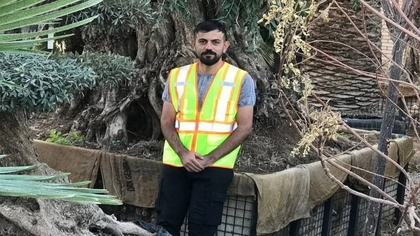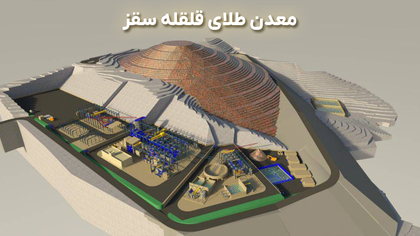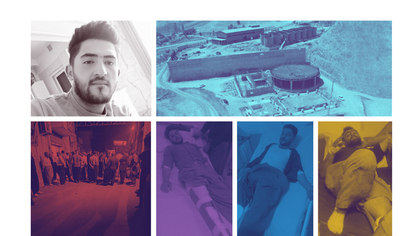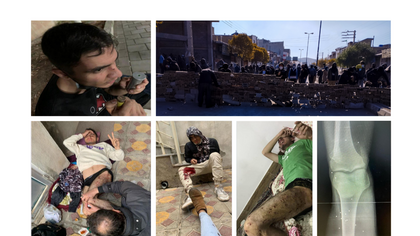Sharif Behruz: PKK Widely Interferes in the Affairs of other Parts of Kurdistan
09:26 - 27 May 2015

Kurdpa: Recent clashes between Iran\'s Kurdistan Democratic Party, PDKI, and Turkey\'s Kurdistan Workers\' Party, PKK stirred an outcry among Kurds that civil war has once again gripped Kurdish political arena. Kurdpa publishes Sharif Behruz\'s full interview with Rachael Avrahm of Jerusalem Online.
It was reported yesterday that the Kurdistan Workers Party (PKK) attacked the Kurdistan Democratic Party of Iran (PDKI) Peshmerga on the border between Iraqi and Iranian Kurdistan, killing one PDKI Peshmerga member. In an exclusive interview withRachel Avraham of the JerusalemOnline, Sharif Behruz, the former US Representative of the PDKI and the current Iran Roundtable President, stated that PKK’s motive is hegemony: “We know for a fact that the PKK despite being a Kurdish Party advocating for the rights of the Kurds in Turkey widely interferes in the affairs of other parts, regrettably often in line with the interests of the oppressive states.”
Excerpts of the interview can be found on JerusalmOnline website. For better understanding of the current situation and broader analysis, Iran Roundtable publishes the full text of the interview:
Rachel Avraham: Please tell me why the PKK would be interested in attacking PDKI forces along the Iranian border?
Sharif Behruz: As far as the motives are concerned, PKK leadership would be in a better position to elaborate on their motives; however, we know for a fact that PKK, despite being a Kurdish party advocating for the rights of Kurds in Turkey, widely interferes in the affairs of other parts, regrettably often times in line with the interest of the oppressive states. We have seen this in South, West and Eastern Kurdistan. I can say that PKK’s hegemonic agenda is the main motive behind the recent altercation that led to one death and several injuries.
Rachel Avraham: I heard that the PKK was cooperating with the Assad regime. Do you know if they are also cooperating with Iran and this would prompt them to oppose any forces that support democracy in Iranian Kurdistan?
Sharif Behruz: Given the precarious circumstances that the division of Kurdistan in the 20th century has created, Kurdish struggle in each part would not have been possible without some sort of relationship with adjacent states. As central governments have been able to unite against Kurds, and use one against another, Kurds have also been taking advantage of rift among states to further their cause. This state and non-state relationship becomes problematic when the particular party in question uses this relations with the state in question against the interest of the Kurds in that part controlled by that state. Unfortunately, in Syria, PKK’s relationship was against the national Kurdish movement in Syria, and it is the same in Iran as well. The mere fact that PKK has been able to use the territories between Iran and Iraq as their bases for many years to conduct their fight against the Turkish state, it has been due to the blessing and support from the Iranians. Both sides have their reasons for such a cooperation, but certainly it is not in the best interest of Kurds in Iran, mainly the political parties.
Rachel Avraham: Please describe the present situation in Iranian Kurdistan and why KDPI felt that it was import to reinforce along the border for this reason.
Sharif Behruz: As you are well aware, the situation in the Middle East is very volatile. Strong and stable states have vanished. Kurds in Syria were rarely known to the outside world, but now it is no longer a question to be denied. Iran can be one of those oppressive states that can crumble from within. Kurds in Iran have always played a major role in the transformation of Iran since the creation of modern state in 1920s. They still continue to play the same role through their experienced political parties which are banned in Iran. They political parties, PDKI including, play a significant role in shaping public opinion in Kurdistan and across Iran. The recent unrest in Mahabad proved that Kurdish people in Iran are ready for such an uprising if supported and well organized. This is done by maintaining their link with their constituents. PDKI, despite many regional obstacles has been able to move back and forth between their bases in Iraqi Kurdistan and Iranian Kurdistan. Such movements would definitely be easier if bases are closer to the border as they once were in Qandil Mountains where PKK is right now. However, PKK has forces along major routes and areas where such border crossing can take place, and unfortunately, PDKI has avoided such altercations by taking more dangerous routes. It is important to know that PDKI and PKK as two political parties can and should coordinate their activities to avoid tensions, however, PDKI or no other Iranian Kurdish political parties should take permission from PKK or anyone else of how to pursue their struggle for national rights in Iran, especially in the areas that are part and parcel of Iranian Kurdistan.
Rachel Avraham: How do you think internal infighting among the Kurdish groups could potentially influence the struggle against ISIS?
Sharif Behruz: Kurdish internal infighting and bickering well explains the current situation that the Kurds are in. Kurds would have their own state if all sides were united and spoke with one voice in the turn of the 20th century. The same goes in explaining the current situation. In Iran, Kurdish political parties are divided more than ever, the same divisions play an important role in Iranian Islamic forces advances deep inside Kurdish territories after the 1979 Revolution. In Turkey, Kurdish political landscape is divided. PKK, despite being very instrumental in Kurdish struggle against the racist Turkish state, the party’s hegemonic agenda has left little room for cooperation among Kurdish parties in Turkey; furthermore, due to such policies, it has alienated half of Kurds in Turkey who prefer to vote for AKP than PKK affiliated parties such as HDP. In Syrian Kurdistan same policies led to the takeover of most of the Kurdish areas in Syria by ISIS. If PKK affiliated PYD was inclusive, there were thousands from other parties who would be ready to fight against ISIS, but they chose the destruction in Kobani to cooperation with Syrian Kurdish political parties. They still remain devisive.
I believe it is the other Syrian Kurdish political parties sense of national duty and the threats of ISIS terrorists, otherwise, we would have seen civil war among Syrian Kurds a long time ago. In Iraqi Kurdistan, even though we have some sort of stability and self-government, it is not much different from the rest. ISIS was able to over-run Peshmarga forces who still function as political party forces rather than national professional forces. Most of the Peshmargas are on the payroll of the two main political parties with little or no proper trainings. Of course, in such circumstances hostile forces such as ISIS and others can exploit such rifts and cause irreversible damage to our national unity and cause.
Rachel Avraham: Please describe for our readers the differences in ideology between the PKK and PDKI, highlighting how you guys differ and how this affected the recent attack?
Sharif Behruz: PDKI is an Iranian Kurdish political party that since the outset has been advocating and struggling for the right of Kurds in Iran. PDKI does not recruit members from other parts of Kurdistan for the sake of interference in the affairs of other parts. Of course PDKI still believes in the Kurdish people as a nation that deserve, like all the other nations, a state of their own; however, PDKI is a very articulate and realistic political party. Currently, PDKI is seeking to establish a federal democratic structure in Iran with Kurds of Iran ruling over their own areas.
On the other hand PKK started as an ultra-nationalist Marxist political party advocating for an independent Kurdish state in the 80 and 90s. Obviously, their main fight was against the Turkish state, and did little to fight against the other central governments. As mentioned earlier, they even forged alliances at the expense of the Kurds of Iran and Syria. PKK’s ideology has changed since Mr. Ocalan’s capture. They rarely mentions or talk about Kurds, national rights or Kurdistan. They have abandoned their national cause and taken up the totalitarian Marxist agenda, and often accuse PDKI and other nationalist Kurdish parties as the stooges of the capitalist system. Following the crisis in the region, PKK has been and still is in the realm of Shia crescent, as the top person of PKK, Camil Bayak himself an Alawai Shia claimed in the past, and so has Mr Ocalan in his calls from his prison cell.
It is unfortunate for the Kurds of Turkey to be on the wrong side of history, and PKK is mainly to be blamed for this. Lastly, PKK, unlike PDKI interferes in the affairs of other parts. As mentioned, they created PYD in Syrian Kurdistan, simultaneously, they formed PJAK in Iran. You know, Bashar Assad left the Kurdish areas in Syria to PYD in agreement, similar arrangement, much hideous however, was done in Iran more than a decade ago to have PKK guard its borders, through PJAK, even though they pretended that PJAK was actually fighting the Iranian government. Iran was and still is well aware of the leverage the traditional and pro-western Kurdish parties such as PDKI, and they were ready to do anything to undermine their popularity, which were successful to some extent.
Rachel Avraham: Please describe to me how Kurdish society has reacted to the recent attack by the Kurdish forces?
Sharif Behruz: Kurdish society in general is fed up with Kurdish political forces infighting. They are upset that even to this day, party interest lies well above national interest. They have overwhelmingly condemned it. However, it is noteworthy, Kurds all over Kurdistan well know both Kurdish political parties. PDKI has good relations with all Kurdish political parties and believes in a plural and democratic society. PDKI has often abandoned partisan interests for the sake of national interests.
PKK on the other hand, has engaged in infighting with almost all Kurdish political parties. PKK has fought Iraq’s PUK and KDP in the past. It has fought the Kurdish political parties in Turkey and Syria as well. PKK has no or little relations with other Kurdish political parties and views itself as the master and owner of Kurdistan. Kurds know in general that PDKI is a respected political party and will do anything to avoid and now end the infighting. However, the onus was on the PKK to avoid such hostility. PKK’s HDP is in the middle of an election campaign. Such hostilities would definitely make people think twice before voting for PKK backed HDP.
Lastly, this is a first time two Kurdish forces from Turkey and Iran face each other militarily; PKK/PJAK will lose the little support they were enjoying in Iranian Kurdistan. Above all, this recent episode proves how difficult it is and will become the task of nation building given the geo-political complexities of Kurdistan.
*The full interview was taken from Iran Roundtable with Sharif Behruz\'s consent.
It was reported yesterday that the Kurdistan Workers Party (PKK) attacked the Kurdistan Democratic Party of Iran (PDKI) Peshmerga on the border between Iraqi and Iranian Kurdistan, killing one PDKI Peshmerga member. In an exclusive interview withRachel Avraham of the JerusalemOnline, Sharif Behruz, the former US Representative of the PDKI and the current Iran Roundtable President, stated that PKK’s motive is hegemony: “We know for a fact that the PKK despite being a Kurdish Party advocating for the rights of the Kurds in Turkey widely interferes in the affairs of other parts, regrettably often in line with the interests of the oppressive states.”
Excerpts of the interview can be found on JerusalmOnline website. For better understanding of the current situation and broader analysis, Iran Roundtable publishes the full text of the interview:
Rachel Avraham: Please tell me why the PKK would be interested in attacking PDKI forces along the Iranian border?
Sharif Behruz: As far as the motives are concerned, PKK leadership would be in a better position to elaborate on their motives; however, we know for a fact that PKK, despite being a Kurdish party advocating for the rights of Kurds in Turkey, widely interferes in the affairs of other parts, regrettably often times in line with the interest of the oppressive states. We have seen this in South, West and Eastern Kurdistan. I can say that PKK’s hegemonic agenda is the main motive behind the recent altercation that led to one death and several injuries.
Rachel Avraham: I heard that the PKK was cooperating with the Assad regime. Do you know if they are also cooperating with Iran and this would prompt them to oppose any forces that support democracy in Iranian Kurdistan?
Sharif Behruz: Given the precarious circumstances that the division of Kurdistan in the 20th century has created, Kurdish struggle in each part would not have been possible without some sort of relationship with adjacent states. As central governments have been able to unite against Kurds, and use one against another, Kurds have also been taking advantage of rift among states to further their cause. This state and non-state relationship becomes problematic when the particular party in question uses this relations with the state in question against the interest of the Kurds in that part controlled by that state. Unfortunately, in Syria, PKK’s relationship was against the national Kurdish movement in Syria, and it is the same in Iran as well. The mere fact that PKK has been able to use the territories between Iran and Iraq as their bases for many years to conduct their fight against the Turkish state, it has been due to the blessing and support from the Iranians. Both sides have their reasons for such a cooperation, but certainly it is not in the best interest of Kurds in Iran, mainly the political parties.
Rachel Avraham: Please describe the present situation in Iranian Kurdistan and why KDPI felt that it was import to reinforce along the border for this reason.
Sharif Behruz: As you are well aware, the situation in the Middle East is very volatile. Strong and stable states have vanished. Kurds in Syria were rarely known to the outside world, but now it is no longer a question to be denied. Iran can be one of those oppressive states that can crumble from within. Kurds in Iran have always played a major role in the transformation of Iran since the creation of modern state in 1920s. They still continue to play the same role through their experienced political parties which are banned in Iran. They political parties, PDKI including, play a significant role in shaping public opinion in Kurdistan and across Iran. The recent unrest in Mahabad proved that Kurdish people in Iran are ready for such an uprising if supported and well organized. This is done by maintaining their link with their constituents. PDKI, despite many regional obstacles has been able to move back and forth between their bases in Iraqi Kurdistan and Iranian Kurdistan. Such movements would definitely be easier if bases are closer to the border as they once were in Qandil Mountains where PKK is right now. However, PKK has forces along major routes and areas where such border crossing can take place, and unfortunately, PDKI has avoided such altercations by taking more dangerous routes. It is important to know that PDKI and PKK as two political parties can and should coordinate their activities to avoid tensions, however, PDKI or no other Iranian Kurdish political parties should take permission from PKK or anyone else of how to pursue their struggle for national rights in Iran, especially in the areas that are part and parcel of Iranian Kurdistan.
Rachel Avraham: How do you think internal infighting among the Kurdish groups could potentially influence the struggle against ISIS?
Sharif Behruz: Kurdish internal infighting and bickering well explains the current situation that the Kurds are in. Kurds would have their own state if all sides were united and spoke with one voice in the turn of the 20th century. The same goes in explaining the current situation. In Iran, Kurdish political parties are divided more than ever, the same divisions play an important role in Iranian Islamic forces advances deep inside Kurdish territories after the 1979 Revolution. In Turkey, Kurdish political landscape is divided. PKK, despite being very instrumental in Kurdish struggle against the racist Turkish state, the party’s hegemonic agenda has left little room for cooperation among Kurdish parties in Turkey; furthermore, due to such policies, it has alienated half of Kurds in Turkey who prefer to vote for AKP than PKK affiliated parties such as HDP. In Syrian Kurdistan same policies led to the takeover of most of the Kurdish areas in Syria by ISIS. If PKK affiliated PYD was inclusive, there were thousands from other parties who would be ready to fight against ISIS, but they chose the destruction in Kobani to cooperation with Syrian Kurdish political parties. They still remain devisive.
I believe it is the other Syrian Kurdish political parties sense of national duty and the threats of ISIS terrorists, otherwise, we would have seen civil war among Syrian Kurds a long time ago. In Iraqi Kurdistan, even though we have some sort of stability and self-government, it is not much different from the rest. ISIS was able to over-run Peshmarga forces who still function as political party forces rather than national professional forces. Most of the Peshmargas are on the payroll of the two main political parties with little or no proper trainings. Of course, in such circumstances hostile forces such as ISIS and others can exploit such rifts and cause irreversible damage to our national unity and cause.
Rachel Avraham: Please describe for our readers the differences in ideology between the PKK and PDKI, highlighting how you guys differ and how this affected the recent attack?
Sharif Behruz: PDKI is an Iranian Kurdish political party that since the outset has been advocating and struggling for the right of Kurds in Iran. PDKI does not recruit members from other parts of Kurdistan for the sake of interference in the affairs of other parts. Of course PDKI still believes in the Kurdish people as a nation that deserve, like all the other nations, a state of their own; however, PDKI is a very articulate and realistic political party. Currently, PDKI is seeking to establish a federal democratic structure in Iran with Kurds of Iran ruling over their own areas.
On the other hand PKK started as an ultra-nationalist Marxist political party advocating for an independent Kurdish state in the 80 and 90s. Obviously, their main fight was against the Turkish state, and did little to fight against the other central governments. As mentioned earlier, they even forged alliances at the expense of the Kurds of Iran and Syria. PKK’s ideology has changed since Mr. Ocalan’s capture. They rarely mentions or talk about Kurds, national rights or Kurdistan. They have abandoned their national cause and taken up the totalitarian Marxist agenda, and often accuse PDKI and other nationalist Kurdish parties as the stooges of the capitalist system. Following the crisis in the region, PKK has been and still is in the realm of Shia crescent, as the top person of PKK, Camil Bayak himself an Alawai Shia claimed in the past, and so has Mr Ocalan in his calls from his prison cell.
It is unfortunate for the Kurds of Turkey to be on the wrong side of history, and PKK is mainly to be blamed for this. Lastly, PKK, unlike PDKI interferes in the affairs of other parts. As mentioned, they created PYD in Syrian Kurdistan, simultaneously, they formed PJAK in Iran. You know, Bashar Assad left the Kurdish areas in Syria to PYD in agreement, similar arrangement, much hideous however, was done in Iran more than a decade ago to have PKK guard its borders, through PJAK, even though they pretended that PJAK was actually fighting the Iranian government. Iran was and still is well aware of the leverage the traditional and pro-western Kurdish parties such as PDKI, and they were ready to do anything to undermine their popularity, which were successful to some extent.
Rachel Avraham: Please describe to me how Kurdish society has reacted to the recent attack by the Kurdish forces?
Sharif Behruz: Kurdish society in general is fed up with Kurdish political forces infighting. They are upset that even to this day, party interest lies well above national interest. They have overwhelmingly condemned it. However, it is noteworthy, Kurds all over Kurdistan well know both Kurdish political parties. PDKI has good relations with all Kurdish political parties and believes in a plural and democratic society. PDKI has often abandoned partisan interests for the sake of national interests.
PKK on the other hand, has engaged in infighting with almost all Kurdish political parties. PKK has fought Iraq’s PUK and KDP in the past. It has fought the Kurdish political parties in Turkey and Syria as well. PKK has no or little relations with other Kurdish political parties and views itself as the master and owner of Kurdistan. Kurds know in general that PDKI is a respected political party and will do anything to avoid and now end the infighting. However, the onus was on the PKK to avoid such hostility. PKK’s HDP is in the middle of an election campaign. Such hostilities would definitely make people think twice before voting for PKK backed HDP.
Lastly, this is a first time two Kurdish forces from Turkey and Iran face each other militarily; PKK/PJAK will lose the little support they were enjoying in Iranian Kurdistan. Above all, this recent episode proves how difficult it is and will become the task of nation building given the geo-political complexities of Kurdistan.
*The full interview was taken from Iran Roundtable with Sharif Behruz\'s consent.



